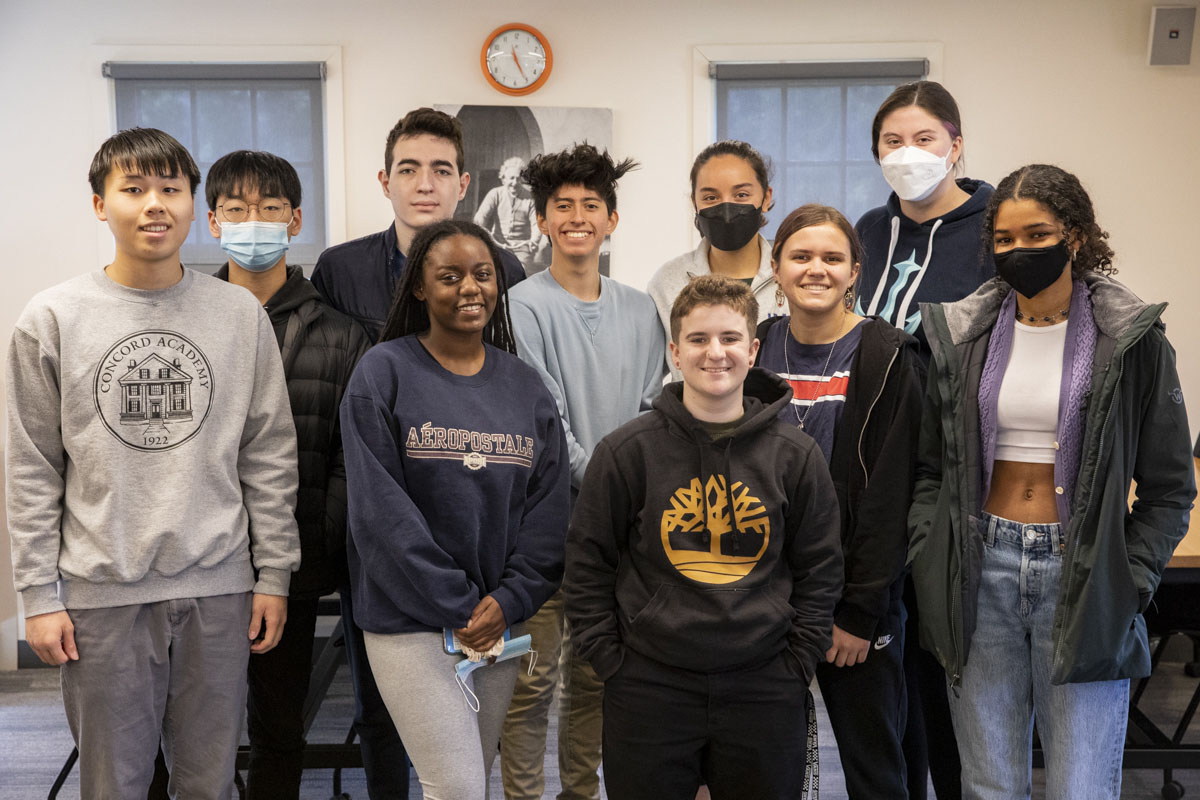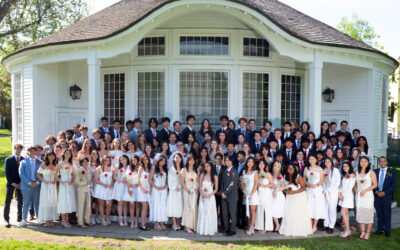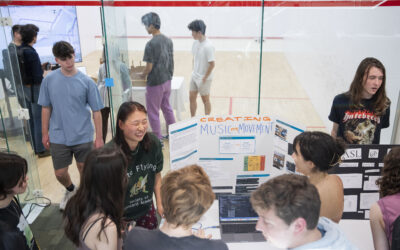
Ten of the 16 Writing Associates, all juniors, in the library classroom where they help fellow CA students in the new peer-to-peer Writing Center at CA.
In March, students gathered in Concord Academy’s library classroom to listen to six 10th graders read aloud works of creative nonfiction they had written for their U.S. history class on the Civil War and Reconstruction. While enjoying cookies and talking about their writing, they shared letters, journal entries, and short stories set in the 1850s about Black Bostonians’ efforts to protect people fleeing slavery from Federal marshals seeking to deport them, as well as their work to desegregate Boston’s schools. As much a focus as sharing their knowledge was discussing the process of writing and revising pieces they had been working on with fellow CA students in the Writing Center, a new endeavor at Concord Academy this year.
It was the second public reading sponsored by the Writing Center, and just one of the positive outcomes of this brainchild of English teacher Nancy Boutilier and history teacher Stephanie Manzella P’14 ’17 ’18. Last spring these two CA faculty members received Department X funding to research and consult with writing centers at schools around New England, talk with teachers who have designed or sustained them, and develop a sustainable model for a writing center to pilot at CA in the 2021–22 academic year.
Boutilier says the peer-to-peer format they settled on took inspiration in part from the student-led writing center at Oberlin College, where she taught before joining the CA faculty. “It’s really a college model, but it’s absolutely working at the high school level too,” she says, especially as a complement to the existing support for students from faculty as well as from tutors in the Academic Support Center. “We knew about the benefits of peer feedback, benefits that serve both the writer and the peer reader.”
They set out looking for older students who would embrace the role of “Writing Associates”: students who actively engage in the process of writing, read attentively, listen well, and want to serve the CA community—individuals who would enjoy engaging with the work of their peers and learning more about the writing process themselves. In the Writing Center’s inaugural year, 16 juniors volunteered, attended trainings, and have regularly been giving one-on-one support for other CA students’ writing.
One of the notions Boutilier and Manzella hoped the Writing Center would help dispel is that writing is done alone, as they said in their Department X proposal: “Our own process reveals that we show our drafts to trusted readers, we get editors to help us shape our work, we seek out feedback—not as remedial, but as an integral part of the writing process. Yet our teaching structures across the curriculum often give students the suggestion that one goes for writing feedback only when ‘stuck.’”
Bobby Skrivanek ’24 first brought a paper to the Writing Center for some feedback before turning it in. “When you read your own essay endlessly, eventually you get to the point where the meaning of some sentences is taken for granted, and anyone besides yourself reading it can’t understand it,” he says. “The meaning is lost in revision. The Writing Center helps catch those mistakes, as well as gives tips on how to vary sentences more, and just add a little bit more spice to your paper. It also serves to help me get unstuck when I just can’t think of what to write next, someone to bounce ideas off of.” He appreciates being able to turn to fellow CA students, and not only teachers, for their perspectives. “They tell you what you have done well, and what you missed,” he says. “It is refreshing to have your strengths highlighted just as much as your weaknesses, and to get some perspective to ground yourself away from the ‘ideal paper.”
Instead of being a resource students could use to “fix” their writing, Boutilier and Manzella wanted the Writing Center to appeal to student writers of all abilities, and across disciplines and genres. A primary goal was to create more time for one-on-one conversation about writing and written work. As they said in their proposal, “We want to reinforce the healthy fact that no draft, no matter the skill level of the writer, is beyond re-visioning, looking again, reading to see it with fresh eyes and being willing to make the changes that make the point clear, stronger, more comprehensive, or cohesive.”
That sort of collegial understanding has begun to emerge among students in the center’s first year. “The library classroom is a very comfortable environment—there’s a real workshop feel in that space,” Manzella says. “We have a lot of repeat customers. Once they come and see the moral support they get and how much the attention of their peers can take the stress out of the writing process, they keep coming back. And the Writing Associates say it helps them as writers too.”
“I was surprised by how rewarding teaching and helping can be!” says Isabella Ginsburg ’23. “It is an amazing feeling to see a student return to the Writing Center with a newfound sense of confidence and new tool in their kit.” She says she became a Writing Associate to give back but has found she’s learned about her own writing as much as she’s helped other students. “I’ve learned that writing isn’t a solo endeavor,” she says. “While you can produce writing by yourself, you only produce good writing by working with others. Because the entire story or argument I am writing is laid out in my head, I often miss places where I don’t explain thoroughly enough or where I forget to give context because it makes too much sense to me. Being a Writing Associate has helped me to distance myself from my own writing so I can see those issues more clearly.”
Nia Adams ’23 recalls how she might have benefitted from help as a younger student, whether with expressing ideas, strengthening a thesis statement, or “just having a different set of eyes to read my work.” She says becoming a Writing Associate has been one of the best ways she has contributed at CA. “In helping other students find their own voices in their pieces of writing, this role has been instrumental to me in finding my own voice in such a giving community like Concord Academy’s,” she says. “As the Writing Center continues to grow and help students, I hope incoming associates can not only also find their very own niche of contribution to CA, but also their value as students, writers, and human beings.”
Another Writing Associate, Mathew Gutierrez ’23, also hopes students who have been benefiting from bringing their work to the Writing Center will be inspired to carry it forward. “I absolutely love seeing this community be so proud of themselves for not only asking for help but for reaching success of their own accord,” he says.
Manzella sees the Writing Center as a natural extension of the storytelling that is core to CA’s school culture. “We spend a lot of time in the Chapel listening to students’s polished words, but there are many more opportunities to share writing outside of chapels,” she says. “Talking about writing with others helps you become a better writer.”
Department X
Department X is an initiative supported by the Faculty Leadership Endowed Fund, part of the Concord Academy Centennial Campaign. Created to provide CA teachers and staff with resources to develop new curricula, exchange ideas across disciplines, and create and seize opportunities for experiential learning, Department X was first introduced six years ago. The funding allows Department X recipients release time from their regular schedules to pursue research projects and interdisciplinary endeavors.
The current recipients of Department X funding in 2021–22 are history teacher Topi Dasgupta P’22 ’25 and English teacher Laurence Vanleynseele P’22, who are partnering this spring on an interdisciplinary digital humanities project, a course that will engage students in thinking about the category of “truth” as mediated through history, fiction, ethics and imagination.
Just announced, in the 2022–23 school year Department X funding will go to theater teacher Shelley Bolman and music teacher Meghan Miller as they seek to broaden the range of voices and experiences represented within each program at Concord Academy.


